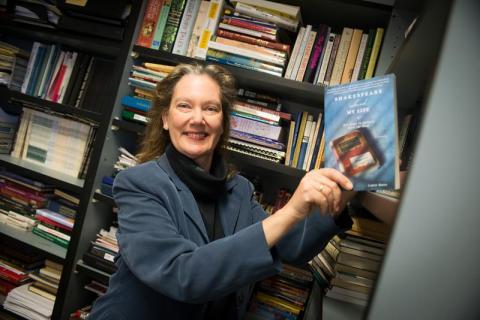
For decades, Laura Bates has walked down prison corridors armed with William Shakespeare's plays and allowed the Bard of Avon to unlock the doors of prisoners' minds. The memoir tells her story and that of one prisoner.

For decades, Laura Bates has walked down prison corridors armed with William Shakespeare's plays and allowed the Bard of Avon to unlock the doors of prisoners' minds. The memoir tells her story and that of one prisoner.
\"Life. Don\'t it go?I mean, I\'m only thirty. I\'m not old.But, you know, I\'ve been in here since I was a kid.It just goes so fast. Man! It just goes so fast.And everybody overlooks enjoying it.They just put themselves in so many prisons.\"--Larry Newton
Larry Newton knows about prisons, physical and mental. As a youth, he spun through juvenile detention centers like they were revolving doors until at 17 he landed in prison with a conviction for murder.
And a life sentence. No parole.
For decades, Laura Bates has walked down prison corridors armed with William Shakespeare\'s plays and allowed the Bard of Avon to unlock the doors of prisoners\' minds. Then she walked into the segregated housing unit at Wabash Valley Correctional Facility and encountered Newton.
Now, the nationally known educator and associate professor of English at Indiana State University has published a book chronicling her and Newton\'s Shakespearian experience in a memoir, \"Shakespeare Saved My Life: Ten Years in Solitary with the Bard.\" Sourcebooks released the paperback in early April.
\"It\'s learning to appreciate life by reading about these people in solitary confinement,\" Bates said, referencing Newton\'s quote on prisons. \"I hope the readers put themselves in the same position to think about what are the prisons that hold them back.\"
Bates has spent more than 25 years teaching prisoners from first tutoring inmates in an Illinois county jail to leading discussions on Shakespeare\'s plays in a state maximum security prison. Recently, Bates has had the opportunity to teach Shakespeare to federal inmates. Her book focuses on a program created in 2003 by officials at Wabash Valley that allowed Bates to take Shakespeare to the prisoners kept segregated from the others in a prison for the prisoners.
\"They created a wonderful forward-looking program,\" she said about the prison officials.
In the book, Bates tells of her journey into teaching in prisons alongside the story of Wabash Valley Correctional Facility prisoner Larry Newton\'s path to Shakespeare. Newton, who was convicted of murder, spent more than 10 years in the segregated housing unit, in solitary for 23 hours a day for a variety of crimes, including attempted escape and stabbing a prison guard.
\"His transformation is such a remarkable one. It\'s a testimony to the power of education, the power of literature,\" Bates said. \"That\'s something all faculty experience on some level in that we\'re changing our students\' lives. Larry\'s story validates what we\'re doing, whether we\'re on campus or in prison.\"
Bates also includes other prisoners she has worked with through the years in her memoir, telling anecdotes of working with the \"worst of the worst\" confined to a super max prison. Those prisoners, some of whom had never heard of Shakespeare, eventually rewrote his plays into modern language. Prisoners in the general population performed those plays, which prison officials recorded to broadcast to the more than 2,000 men confined at Wabash Valley.
By telling their stories, Bates hopes the book presents the reader with a new way to look at prisoners and at Shakespeare.
\"On paper, they look awful,\" she said about the prisoners in segregation. \"But they are human beings whose voices deserve to be heard.\"
She listened to their thoughts, their humor and their philosophies as the prisoners discussed such plays as \"Macbeth.\" The prisoners also began comparing Macbeth\'s actions and thoughts to what happened in their own lives. In discussing Macbeth\'s thoughts on killing Duncan, one prisoner said, \"You gain everything but you lose your humanity. This is what happens to Macbeth. And that\'s what happens to us, out of the choices we make.\"
A literary agent contacted Bates after seeing an MSNBC broadcast on the Shakespeare program. She told Bates, \"There\'s a book here. You need to write this book.\" Bates turned to her hundreds of recorded hours with Newton and to her memories and notes from teaching the inmates and began to write.
Reviews by Booklist and Kirkus have praised the book. The reviewer at Booklist called it, \"A powerful testament to how Shakespeare continues to speak to contemporary readers in all sorts of circumstances.\" The Kirkus review described it as \"An eye-opening study reiterating the perennial power of books, self discipline and the Bard of Avon.\"
Bates worked with about 200 prisoners in segregation at Wabash Valley during the program. She examined the records of 20 who spent the most time studying Shakespeare. Before Shakespeare, the men had more than 600 write ups, with most of those falling into the Class A felony and violent felony categories. After studying Shakespeare, Bates examined the inmates\' records for a similar number of years and found only two violations for cell phone possession.
\"It verifies what we hear again and again - education makes a difference,\" she said.
Bates and Newton are scheduled to be interviewed for NPR\'s \"Tell Me More\" show on April 23, Shakespeare\'s birthday. Bates also will be discussing her memoir and signing copies at Left Bank Books in St. Louis at 7 p.m. on April 26.
Photos:http://isuphoto.smugmug.com/Other/Media-Services/Laura-Bates/i-WQZXWq3/0/L/04_04_13_Laura_bates-4447-L.jpg http://isuphoto.smugmug.com/Other/Media-Services/Laura-Bates/i-fBCM9Kg/0/L/04_04_13_Laura_bates-4423-L.jpg Laura Bates with her memoir \"Shakespeare Saved My Life\" ISU Photo/Tony Campbell
Contact: Laura Bates, Indiana State University, associate professor of English, at 812-237-3141 or laura.bates@indstate.edu
Writer: Jennifer Sicking, Indiana State University, associate director of media relations, at 812-237-7972 or Jennifer.sicking@indstate.edu